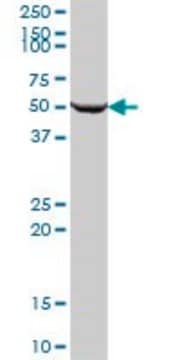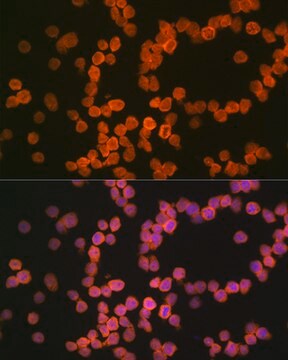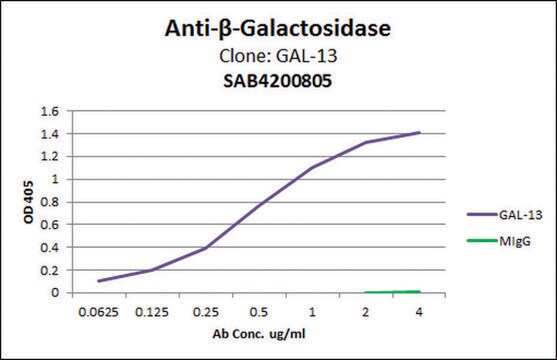SAB4200885
Anti-ACE2 (N-terminal) antibody produced in rabbit
affinity isolated antibody, buffered aqueous solution
Synonym(s):
ACE-related carboxypeptidase, Angiotensin-converting enzyme 2, Angiotensin-converting enzyme homolog (ACEH), Metalloprotease MPROT15
Sign Into View Organizational & Contract Pricing
All Photos(3)
About This Item
UNSPSC Code:
12352203
NACRES:
NA.43
Recommended Products
General description
Angiotensin Converting Enzyme-2 (ACE2) is a membrane-associated and secreted enzyme that is principally expressed on endothelium. In humans, ACE2 occurs mainly in endothelium of heart, kidney, and testis, with other expression in coronary vessel smooth muscle and kidney tubular epithelium.1 ACE2 is a component of the renin-angiotensin system (RAS) that provides protective effects in peripheral tissues.2
Specificity
Anti-ACE2 (N-terminal) antibody specifically recognizes ACE2 from human origin.
Application
Supplied as a solution in 0.01 M phosphate buffered saline pH 7.4, containing 15 mM sodium azide as a preservative.
The antibody may be used in various immunochemical techniques including ELISA, Immunoblotting and Immunohistochemistry. Detection of the ACE2 band by Immunoblotting is specifically inhibited by the immunogen.
Biochem/physiol Actions
Coronaviruses such as SARS-CoV-2 and SARSCoV-1 use the host ACE2 as a co-receptor to gain intracellular entry into the lungs and brain.3,4 The virion expresses a protein termed spike, which directly binds to the extracellular domain of ACE2. A specific region in the spike protein serves as the receptor binding domain (RBD). The ACE2:spike interaction has a high affinity of 15 nM.5
Storage and Stability
For continuous use, store at 2-8°C for up to one month. For extended storage, freeze in working aliquots. Repeated freezing and thawing is not recommended. If slight turbidity occurs upon prolonged storage, clarify the solution by centrifugation before use. Working dilution samples should be discarded if not used within 12 hours. Protect from prolonged exposure to light.
Disclaimer
Unless otherwise stated in our catalog or other company documentation accompanying the product(s), our products are intended for research use only and are not to be used for any other purpose, which includes but is not limited to, unauthorized commercial uses, in vitro diagnostic uses, ex vivo or in vivo therapeutic uses or any type of consumption or application to humans or animals.Data presented is the available current product information and provided as-is. This product has not been tested or verified in any additional applications, sample types, including any clinical use. Experimental conditions must be empirically derived by the user. Our Antibody Guarantee only covers tested applications stated herein and conditions presented in our product information and is not extended to publications.
Storage Class Code
10 - Combustible liquids
WGK
WGK 1
Certificates of Analysis (COA)
Search for Certificates of Analysis (COA) by entering the products Lot/Batch Number. Lot and Batch Numbers can be found on a product’s label following the words ‘Lot’ or ‘Batch’.
Already Own This Product?
Find documentation for the products that you have recently purchased in the Document Library.
Our team of scientists has experience in all areas of research including Life Science, Material Science, Chemical Synthesis, Chromatography, Analytical and many others.
Contact Technical Service






